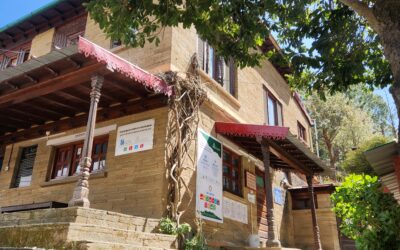“Anokhi” – A unique initiative by Shram Sarathi, in collaboration with STEP Academy (Skill Training, Employ-ability & Placement), supported by Aajeevika Bureau.
It’s designed to equip women entrepreneurs with tools and skills they may need to thrive in their respective businesses. A total of 25 women with an average age of 30 years were identified from the remote villages of south Rajasthan. 70% of them have never been to schools. The batch has a good mix of women-led enterprises as young as a year to 20 years old. Majority of them are grocery shops, which are diversified after intervention, to include cosmetics, shoes, flour mills, dairy products, snacks and beverages.
Last month’s training was about the importance of record keeping. Having studied Chartered Accountancy, I was obvious pick from the team to talk about it.
I learned about the topic almost 10 years back, in a completely different (formal) set-up. The most notable (and only) difference was that I knew how to make sense of written words, and these women didn’t. Why? Only because nobody ever showed them how. They are intelligent, resourceful and smart. They didn’t learn from books, but from their experiences.
Puzzled, I decided to come up with a creative way so that they can relate the session with their life’s experiences. Digging deeper into my memories to recall the days before I learnt to read, I tried to think how did I learn back then. What has stayed with me over all these years? What were the things I enjoyed the most from my early childhood days?
Nursery Rhymes
Next, I sat in front of the laptop, staring at the blank and white screen for almost 30 minutes (felt much longer). I was full of doubts. At this moment, the language barrier seemed bigger than ever. Writing simply was the most complex task. I wanted it to be something women could easily identify with. Thus, I asked the most common name in the area, and built a narrative around it, setting the backdrop as per my observations in the field area. With limited understanding, I tried to bring a touch of local dialect, by using the words that I could manage to catch during multiple conversations. Then I got it proofread by the officer who speaks the language and, here’s how it turned out to be:
किस्सा कंकूडी बाई का
गए दिनों की बात है, कहानी है ये खरी,
दूर गाँव में रहती थी वो, नाम उसका कंकूडी,
लिखना-पढ़ना नहीं हीखा, पण हिसाब की बिलकुल पक्की,
दिमाग तेज़ था घोड़े जैसा, समझ थी जैसे बग्घी,
केलु वाला मकान था उसका, साथ में थी दुकान,
बच्चे-बड़े सब खरीदते, गोली बिस्कुट पकवान,
कुछ ग्राहक तो पैसे देते, कुछ कहते कल दे दूंगा,
कंकूडी को तो जी घबरातो, भूल गयी तो पंगा,
गाँव में रहता भेरू लाल, था वो घनो चालाक,
ग्राहक तो पक्का था लेकिन इरादे थे नापाक,
सामान खरीदता सौ का लेकिन बाद में देता सत्तर,
कंकूडी को गड़बड़ तो लगती पर दिल पे रखती पत्थर,
सोच-सोच के कांकड़ी हो गयी कोई तो होगा उपाय,
कैसे आखिर संभाल के रखूँ, अपनी सारी आय…
Here, we paused for inputs, and women instantly responded. That assured us that everyone was following it. We started with simple questions like:
- What’s the name of the lady we are talking about?
- What does her house look like?
- What kind of products does she sell?
- What is the challenge Kankudi Bai is facing here?
- How was Bheru lal trying to cheat her?
From there, we progressed to relate the questions with central theme of the session, i.e., Record Keeping. Some of the questions were:
- How many of you sell on credit?
- Why is it important to sell on credit even when there’s risk involved?
- Can you suggest a way to ensure the full recovery?
When we asked for suggestions, a young lady replied, “She needs to write it down”.
“But she doesn’t know how to.” – another lady reacted, with concern.
The most experienced of the bunch, a 50-year old said, “What if she doesn’t know! She can ask someone in the family – her husband or children, to do it for her.”
This was bang on. Our faces beamed with joy, and we continued the story,
नानो सो छोरो थो उको, स्कूल में सबसे होशियार,
साँझ में कॉपी में लिख लेता, दिनभर का कारोबार,
अगली बार जब भेरूआया, और खरीदी हल्दी,
कंकूडी ने छोरे को बुलाया, पया लिखवाया जल्दी,
महीना बीता, भेरू आया, करने पूरा हिसाब,
कंकूडी ने छोरे को बोला निकाल अपनी किताब,
भेरू ने देखा, सकपकाया, अब मोल से नटे तो कैसे?
चुपचाप जितने बनते थे, उतने ही दे दिए पैसे…
Here, we took a break again, asked them how keeping records helped Kankudi Bai, and what kind of disputes could have been there if she hadn’t kept it. The answers that surfaced helped us develop an understanding as to why record-keeping is important.
सोचो सोचो अब बतलाओ, पूछते हैं एक सवाल,
हिसाब की किताब ने और दिखलाये क्या क्या कमाल ?
We brainstormed on other purposes that record-keeping could serve and what benefits they see in them.
Most of the information that we were about to deliver, surfaced out of the interaction and debrief, through women’s narrations of their experiences while running the businesses. This bunch of smart women left me awe-struck. Their enthusiasm, commitment, curiosity and quickness to grasp was at par with any youth. Literacy is no bar to measure intelligence, and we all have a child in us who adore rhymes. Be it a kid in play-school or a 50-year old lady in a remote village of South Rajasthan.
If you’re interested in listening to the blog, Here’s an audio clip!




0 Comments